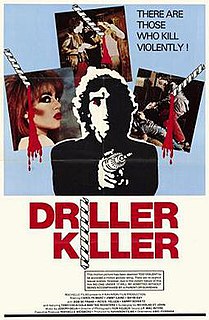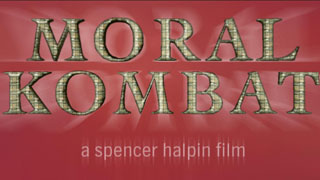Related Research Articles
Video nasty is a colloquial term in the United Kingdom to refer to a number of films, typically low-budget horror and exploitation films, distributed on video cassette that were criticised for their violent content by the press, social commentators and various religious organisations. The term was popularised by the National Viewers' and Listeners' Association (NVALA) in the UK in the early 1980s.

The Video Recordings Act 1984 is an Act of the Parliament of the United Kingdom that was passed in 1984. It states that commercial video recordings offered for sale or for hire within the UK must carry a classification that has been agreed upon by an authority designated by the Home Office. The British Board of Film Classification (BBFC), which had been instrumental in the certification of motion pictures since 1912, was designated as the classifying authority in 1985. Works are classified by the BBFC under an age-rated system ; it is an offence under the Act to supply video works to individuals who are under the age of the classification designated. Works that are refused classification cannot, under the Act, be legally sold or supplied to anyone of any age unless it is educational, or to do with a sport, religion or music and does not depict violence, sex or incite a criminal offence. The BBFC may also require cuts to be made, either to receive a certain age rating, or to be allowed a classification at all.

A grindhouse or action house is an American term for a theatre that mainly shows low-budget horror, splatter and exploitation films for adults. According to historian David Church, this theater type was named after the "grind policy", a film-programming strategy dating back to the early 1920s which continuously showed films at cut-rate ticket prices that typically rose over the course of each day. This exhibition practice was markedly different from the era's more common practice of fewer shows per day and graduated pricing for different seating sections in large urban theatres, which were typically studio-owned.

The Driller Killer is a 1979 black comedy slasher film directed by Abel Ferrara and starring Ferrara, Carolyn Marz, Baybi Day, and Harry Schultz. The plot concerns Reno Miller, a struggling artist in New York City, turning insane from stress and killing derelicts with a power drill.

Cannibal Ferox, also known as Make Them Die Slowly in the US and as Woman from Deep River in Australia, is a 1981 Italian cannibal exploitation horror film written and directed by Umberto Lenzi. Upon its release, the film's US distributor claimed it was "the most violent film ever made". Cannibal Ferox was also claimed to be "banned in 31 countries", although this claim is dubious.

Hollywood Chainsaw Hookers is a 1988 American comedy horror B-movie directed by Fred Olen Ray, and starring Gunnar Hansen, Linnea Quigley, Jay Richardson and Michelle Bauer.
Horror Channel is a British television channel showing horror films and television series and some science fiction. It is broadcast in the UK and Ireland.

The Werewolf is a 1956 American horror science fiction film directed by Fred F. Sears and starring Don Megowan and Joyce Holden.

Spencer Halpin's Moral Kombat is a 2009 documentary film, directed by Spencer Halpin, an American independent filmmaker. The title of the film is in part a reference to the Mortal Kombat series of video games. The title was changed from Moral Kombat to Spencer Halpin's Moral Kombat to avoid the risk of a lawsuit.
Bobby Di Cicco is an Italian-American actor best known for his early roles in the films I Wanna Hold Your Hand (1978) by Robert Zemeckis, 1941 (1979) by Steven Spielberg, Samuel Fuller's The Big Red One (1980), and the John Carpenter-produced The Philadelphia Experiment (1984), in which he co-starred with Michael Paré.
Jake West is a British film director, known mostly for his horror films and for a series of documentaries looking at film censorship and interviewing well-known directors, actors and industry figures.
FrightFest, also known as Horror Channel FrightFest, is an annual film festival held in central London over the August Bank Holiday weekend. The first event was held in the year 2000.

The Warped Ones is a 1960 Japanese Sun Tribe film directed by Koreyoshi Kurahara and starring Tamio Kawachi, Eiji Go, Yuko Chishiro and Noriko Matsumoto. It was produced and distributed by the Nikkatsu Company. The story concerns the young hoodlum Akira, his friends, their transgressions and specifically their revenge on the couple that got him sent to jail, a reporter and his fiancée. When the fiancée finds herself pregnant by Akira she enlists his help with her finance who has become distant since the attack.
Barron Winchester was an American film and stage actor, possibly best known for his role as Eric Stem in the 1979 cult film Delirium.
Alan Jones is a film critic, broadcaster and reporter on the Horror Fantasy genre and has travelled the world to report on movies in production. His first assignment was the original Star Wars in 1977, after which he became London correspondent for Cinefantastique magazine (1977–2002) and reviewed for British magazine Starburst from 1980 until 2008. A film critic for Film Review and Radio Times, he has made contributions to the Radio Times Guide to Films, the Radio Times Guide to Science Fiction and Halliwell's Film Guide. He has also served as film critic for BBC News 24, Front Row on BBC Radio 4, and on Sky News programme Sunrise. He has worked for many of the long-established cinema magazines – Empire, Premiere and Total Film, an article in which – The Splat Pack – is credited for the first use of a term that is now part of film industry jargon.

Massacre Mafia Style is a 1974 independent film written, directed, produced by, and starring Italian-American crooner-actor Duke Mitchell. The tagline for the film was "You’re IN, or you’re IN THE WAY."
Marion Lipschutz is an American documentary producer, writer, and director. Lipschutz has directed and produced award-winning documentaries, including BEI BEI, The Education of Shelby Knox and Young Lakota.
Nucleus Films is a UK-based independent DVD and Blu-Ray distribution label and private limited company, founded in 2003 by researcher and writer Marc Morris and film director Jake West. The label distributes rare cult films in the horror and erotica genres. They have also produced a range of documentaries and featurettes about the making of films, noted film directors and the fight against censorship.

Video Nasties: Moral Panic, Censorship & Videotape is a 2010 documentary about the Video Nasties controversy of the early 1980s. It was premiered at London FrightFest in August 2010 and followed by a panel discussion which included producer Marc Morris and director Jake West of Nucleus Films, professor Martin Barker and film director Tobe Hooper. In 2014 the documentary was followed by Video Nasties: Draconian Days, which covered the period from 1984 to 1989 after the introduction of the Video Recordings Act 1984. The two documentaries have contributed to a greater understanding of the Video Nasties phenomenon, and the box sets include archive material, trailers, and analysis from a range of academics, actors and journalists, including CP Lee, Stephen Thrower, Brad Stevens, Julian Petley, Xavier Mendik, Patricia MacCormack. Allan Bryce, Emily Booth.